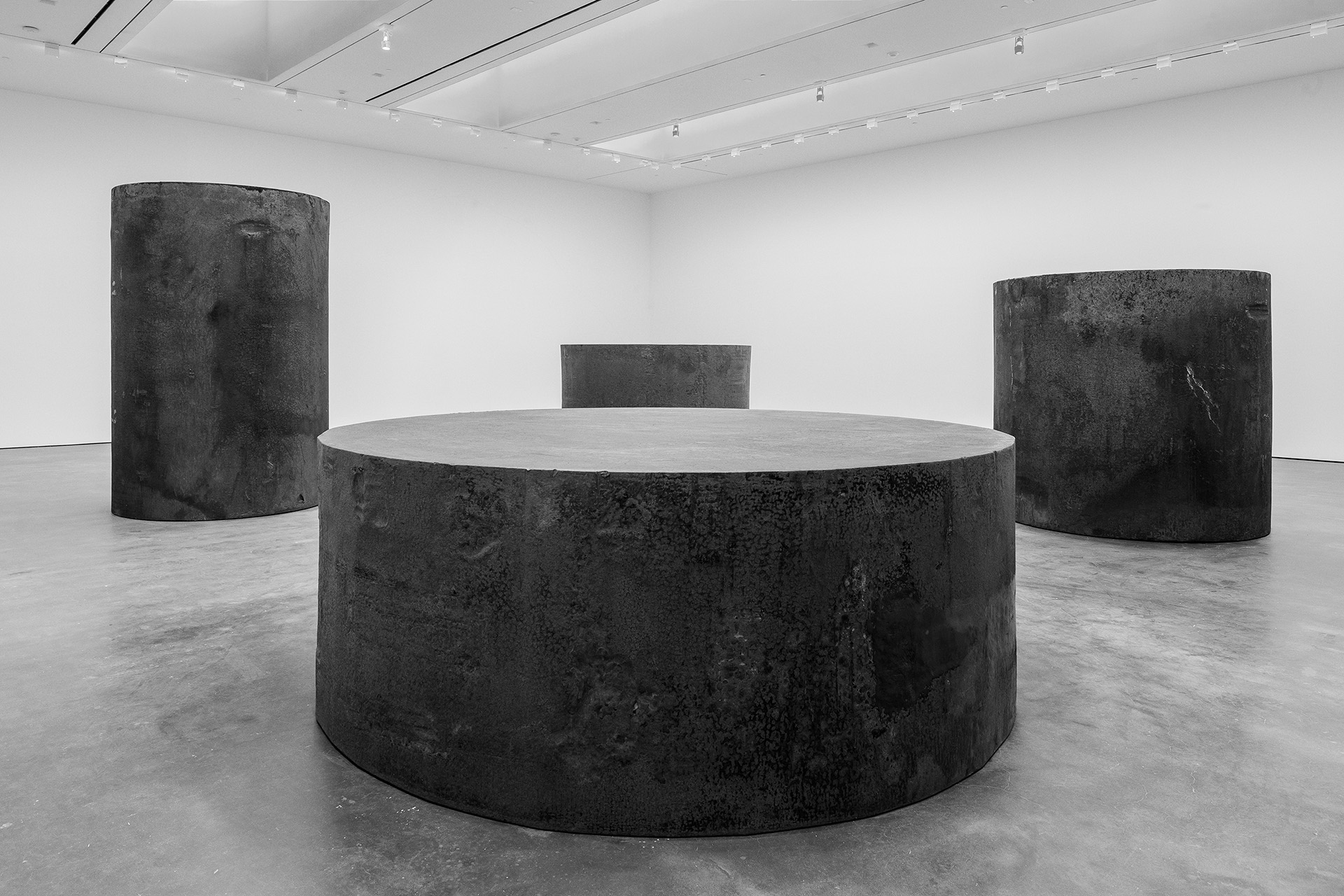Monumental Richard Serra Sculpture in Custom-Designed Building by Thomas Phifer to Go on View at Glenstone Museum Beginning June 23

Four Rounds: Equal Weight, Unequal Measure, 2017
forged steel
© 2022 Richard Serra / Artists Rights Society (ARS), New York
Photo: Cristiano Mascaro
Courtesy David Zwirner, New York/London
Four Rounds: Equal Weight, Unequal Measure by Richard Serra soon to be On View in New Building Designed in Collaboration Between the Artist and Architect Thomas Phifer
POTOMAC, MD, June 1, 2022 – Today, Glenstone Museum announced that the sculpture Four Rounds: Equal Weight, Unequal Measure, 2017, by Richard Serra will join the outdoor sculpture program in a new building opening to the public on June 23.
Sited along the Woodland Trail in a densely wooded area across a restored stream, the 4,000-square-foot concrete structure was designed by Thomas Phifer of Thomas Phifer and Partners, in collaboration with the artist Richard Serra. The building is the first new construction on Glenstone’s grounds since the opening of the Pavilions in 2018 and invites visitors to experience an entirely new part of the Glenstone landscape.
One of the most influential artists of his generation, Richard Serra (American, b. 1938), has devoted his decades-long sculpture practice to considering the dynamic between form, space, and material. Four Rounds: Equal Weight, Unequal Measure is his third monumental sculpture at Glenstone, joining Sylvester, 2001, the torqued spiral anchoring the entrance to the Gallery building, and Contour 290, 2004, a ribbon of steel bisecting the meadow that sits exactly 290 feet above sea level.
Four Rounds: Equal Weight, Unequal Measure is one work composed of four cylindrical forms forged from steel, each weighing 82 tons—the heaviest form that a foundry is able to forge—but ranging in height and diameter. The surface of each form carries a rich, textured patina imprinted by the intense pressure of the forging process. The work is housed inside an unadorned structure made of cast-in-place concrete that visitors will approach along a winding boardwalk.
“Richard Serra’s work has been a cornerstone in the collection since the museum’s early days,” said Emily Wei Rales, director and co-founder. “He helped build Glenstone’s reputation as a destination for monumental site-specific artwork. The addition of Four Rounds to our outdoor program is made all the more special by the collaborative process between Richard and our architect, Tom Phifer. The building they designed is more than a container for the sculpture; it’s an integral part of the experience. We look forward to sharing the beauty of this extraordinary achievement with our visitors.”
Two bridges allow pedestrians to cross the restored stream that was the former eastern limit of Glenstone’s visitor experience. An elevated boardwalk allows visitors to move smoothly across a wetland meadow to the new Serra pavilion. The proportions of the interior building are tuned to the sculpture’s scale and placement. A simple concrete roof is supported by large beams, which serve as walls for the apertures that illuminate the space. White glass skylights bring in diffuse daylight. Variations in light and shadow are dictated by nature, providing visitors an unmediated experience that changes with the season.
“It’s a privilege to work with Glenstone again, all the more so because of the exceptional opportunity to engage with Richard Serra,” Thomas Phifer said. “Together, we were able to consider every detail of how the volume of the space interacts with the masses within, how the different qualities of light filtering down animate the surfaces of the sculpture, how the texture of the building’s concrete enters into dialogue with Serra’s steel. I hope Glenstone’s visitors feel as deeply satisfied as I do when they encounter this combination of place and object that is so apparently simple and elemental in its wholeness, and yet is completely imbued with thought.”
About Richard Serra
Since the 1960s, Richard Serra has exhibited nationally and internationally and installed more than 100 permanent outdoor works. In 2007, the Museum of Modern Art, New York mounted a retrospective of his work and, in 2011, a retrospective of his drawing practice traveled from the Metropolitan Museum of Art, New York, to the San Francisco Museum of Modern Art and the Menil Collection, Houston. He has participated in several international exhibitions including documenta (1972, 1977, 1982, and 1987) and the Venice Biennale (1980, 1984, 2001, and 2013). Among many other awards, in 2018 he received the J. Paul Getty Medal and in 2015 he received France’s highest honor as a Chevalier of the Legion of Honor.
About Glenstone
Glenstone, a museum of modern and contemporary art, is integrated into nearly 300 acres of gently rolling pasture and unspoiled woodland in Montgomery County, Maryland, less than 15 miles from the heart of Washington, D.C. Established by the not-for-profit Glenstone Foundation, the museum opened in 2006 and provides a contemplative, intimate setting for experiencing iconic works of art and architecture within a natural environment. The museum includes its original building, the Gallery, as well as additional structures opened in its 2018 expansion: the Arrival Hall (LEED platinum), the Pavilions, and the Café (both LEED gold).
Glenstone is open Thursdays through Sundays, 10 a.m. to 5 p.m. Visitors are also invited to explore the grounds or participate in self-guided sculpture tours. Admission to Glenstone is free and visits can be scheduled online at: www.glenstone.org.
Students 12 and older, active-duty military members, and museum professionals enjoy guaranteed entry for themselves plus one guest upon presenting a valid identification card at the Arrival Hall. Advance registration is not required for visitors in these categories. Passengers who arrive at Glenstone on the Ride On bus (route 301) are also offered guaranteed entry.
For a list of current visitor guidelines, please review the Plan Your Visit page on www.glenstone.org.
Media Contacts
Erica Bogese, Senior Communications Manager, Glenstone Museum: erica.bogese@glenstone.org
Natalie Miller, Polskin Arts & Communications Counselors: natalie.miller@finnpartners.com
###